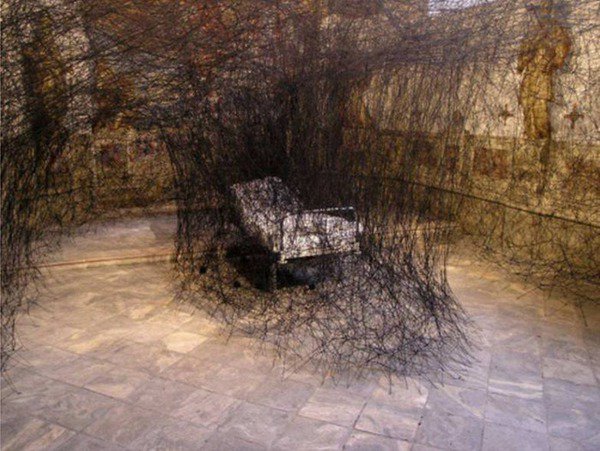Tout cannibals / Chiharu Shiota
dal 10/2/2011 al 13/5/2011
Segnalato da
Chiharu Shiota
Makoto Aida
Pilar Albarracin
Gilles Barbier
Michael Borremans
Norbert Bisky
Patty Chang
Jake & Dinos Chapman
Will Cotton
Wim Delvoye
Erik Dietman
Marcel Dzama
James Ensor
Renato Garza Cervera
Francisco de Goya
J. J. Grandville
Sandra Vasquez de la Horra
Pieter Hugo
Melissa Ichiuji
John Isaacs
Oda Jaune
Michel Journiac
Fernand Khnopff
Frederique Loutz
Saverio Lucariello
Alberto Martini
Philippe Mayaux
Patrizio Di Massimo
Theo Mercier
Yasumasa Morimura
Vik Muniz
Wangechi Mutu
Alvaro Oyarzun
Giov. Battista Podesta
Odilon Redon
Félicien Rops
Bettina Reims
Toshio Saeki
Cindy Sherman
Dana Schutz
Jana Sterbak
Adriana Varejao
Joel-Peter Witkin
Ralf Ziervogel
Jerome Zonder
Jeanette Zwingenberger
10/2/2011
Tout cannibals / Chiharu Shiota
La Maison Rouge, Paris
Tout cannibals is an exhibition on anthropophagy and its representations in contemporary visual art. On display pieces for the most part by young artists working independently of each other on the concept of incorporation. Since the mid-1990s, Shiota has become known for her installations of tangled threads. By suspending strands of black wool from the walls, floors and ceilings of gallery spaces, she creates impressive graphic networks through which visitors must find their way and their place.

TOUS CANNIBALES
Curated by Jeanette Zwingenberger
"We are all cannibals. The simplest way to identify with another is still to eat them."
Claude Lévi-Strauss, La Repubblica, 1993.
Makoto Aida, Pilar Albarracin, Gilles Barbier, Michaël Borremans, Norbert Bisky, Patty Chang, Jake & Dinos Chapman, Will Cotton, Wim Delvoye, Erik Dietman, Marcel Dzama, James Ensor, Renato Garza Cervera, Francisco de Goya, J. J. Grandville, Sandra Vasquez de la Horra, Pieter Hugo, Melissa Ichiuji, John Isaacs, Oda Jaune, Michel Journiac, Fernand Khnopff, Frédérique Loutz, Saverio Lucariello, Alberto Martini, Philippe Mayaux, Patrizio Di Massimo, Théo Mercier, Yasumasa Morimura, Vik Muniz, Wangechi Mutu, Álvaro Oyarzún, Giov.Battista Podesta, Odilon Redon, Félicien Rops, Bettina Reims, Toshio Saeki, Cindy Sherman, Dana Schutz, Jana Sterbak, Adriana Varejâo, Joel-Peter Witkin, Ralf Ziervogel, Jérôme Zonder.
From February 12th to May 15th, la maison rouge is staging an exhibition on anthropophagy and its representations in contemporary visual art.The exhibition’s curator has chosen pieces for the most part by young artists working independently of each other on the concept of incorporation. A body of contemporary works (photography, video, installation, sculpture, drawing and painting) finds echoes in a historic perspective (illustrations, illuminated texts, engravings and ritual objects). Together, they show how the theme of anthropophagy has persisted and evolved through time and place.
Despite being largely ignored by art critics and theorists, anthropophagy is an underlying theme of current creation, as the presence in the show of major artists from the contemporary scene confirms. Leaving aside images of gore, Jeanette Zwingenberger has chosen artists, almost half of whom are women, who address the cruelty of anthropophagy from a critical standpoint and with a certain delicacy. Dreamlike representations voice and develop the questions that surround this notion.
In an age of cloning, organ transplants and virtual worlds, when the integrity of the body has been thrown into doubt, these artists reveal how perceptions of the body have changed. They take the body apart, transforming and reconstructing it as a hybrid organism; one that both eats and is eaten. Do we not absorb and devour our peers as we construct and share with them our individual self? As Claude Lévi-Strauss observes in a quotation which the curator highlights: "We are all cannibals. After all, the simplest way to identify with another is still to eat them." (La Repubblica, 1993).
Tous cannibales invites us to lift the veil on a disturbing, repressed, even taboo subject that has implications for ethnology, history, psychoanalysis, medicine and religion.
The exhibition will continue in Berlin, from May 28th to September 18th, at Me Collectors Room Berlin (www.me-berlin.com), recently opened by the collector Thomas Olbricht.
-------------------------
CHIHARU SHIOTA
Home Of Memory
La maison rouge presents the first major exhibition in Paris of Chiharu Shiota, a Berlin-based Japanese artist, for which she will produce two large-format installations. These are After the Dream, a work composed of suspended threads, and From Where We Come and What We Are, composed of suitcases. The exhibition will also show a selection of drawings.
Since the mid-1990s, Chiharu Shiota has become known for her installations of tangled threads. By suspending strands of black wool from the walls, floors and ceilings of gallery spaces, she creates impressive graphic networks through which visitors must find their way and their place. These giant webs often envelop everyday objects such as chairs, beds, pianos or items of clothing, as though the artist were attempting to keep a trace of objects that might otherwise vanish from her memory by imprisoning them in her web.
These threads are like pencil strokes in the air. Thus accumulated, they obstruct the spectator’s view while adding a sculptural dimension to the work. Simple white dresses, suspended and ensnared in this impenetrable cocoon, suggest absent bodies. As the spectator advances further into the installation, they feel they are penetrating the physical manifestation of a mental image.
Chiharu Shiota’s second installation at la maison rouge introduces a new material to her work: hundreds of battered suitcases have been assembled into a shelter, an archetype for a house. This work, entitled From Where We Come and What We Are, gives form to a central theme in her work: what physical and mental memories do we have of our past? Do memories help construct us or do they prevent us from moving on?
Image: Chiharu Shiota
© Courtesy of the artist and La Maison Rouge
presse contac : Claudine Colin Communication
Julie Martinez, 01 42 72 60 01
julie@claudinecolin.com
Opening 11 february 2010, 18-21
La maison rouge
Fondation Antoine de Galbert
10 Bd de la Bastille – 75012 Paris



